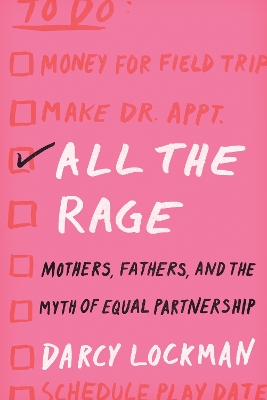Reviewed by Briana @ Pages Unbound on
The author’s attempts to bring in wide-ranging research about related topics, not just how labor is divided in the home and what the consequences of that are for women’s health, their marriage, etc. are great for starting to get at the question of why labor division is so unequal, but they also make the book feel a bit disjointed. Even the subheadings are not particularly clear, and the organization of the book was not always obvious to me. I simply went along with the flow of the research and read the information as it was presented to me. Expect to make your own connections between that information and the question of unequal parenting partnerships, as the author does not always make them explicit herself.
I also did not always love the tone of the book, which can get snarky or dismissive towards men at times. I get it. The author—and a lot of women—are ticked off, and I think the tone will actually resonate with a lot of women who are reading the book because they are mad. However, many men are already defensive about this. Tweet a study about how men don’t do equal housework and watch all the replies come rolling in about how the studies are wrong or how “Well, I do tons of work! I do more than my wife!” or “I mow the lawn once a week!” So this tone probably isn’t going to be a hit with any guy who does pick up the book, and I think that’s a flaw if the goal is to make people self-reflect.
Mostly, however, I love that this book is thought-provoking, and not always in the ways readers might like. I’ve read varying reactions to the book on Goodreads (all from women) and they range from women identifying with the feeling of being burdened with nearly all the household work to women being disgusted that other women would “let” this happen to them. A lot of women feel they would “never put up with this,” but the book uncomfortably makes the reader think about why women do. It might be because, studies suggest, both women and men think men are doing half the work when they’re only doing about 35%. People think their relationships are equal when they’re not. Or it might be because women do feel some happiness at being told they’re a “good wife” or “good mother” when they run the household; they’ve been socialized to think that. Or it might be because, as the author puts a bit flippantly, are you really going to get a divorce because your husband—whom you love and who loves you and, you know, does some work sometimes—didn’t change a diaper? Of course it’s not about the diaper, but the point is that that there are kinds of social factors that help women, and men, rationalize women’s being burdened with all the work, and while it’s easy to look at this situation from the outside and say, “That will never happen to me,” the horrifying truth of the book is that it happens all the time, and uprooting life with a divorce is not an easy option for a lot of women.
Related to this point, the idea that women “let” themselves be left with all the work, I like that the book acknowledges that too many times solutions to problems like this put the onus on women to fix sexism and injustice. If women would just do something differently, the theory is, if they would just be assertive enough or ask men to do the chores enough or just…do some magic thing, then men would do more housework and childcare. It shouldn’t work that way. Having to repeatedly ask someone to do work in their own home is labor of its own, and it’s not the solution most women are looking for, particularly when they might be called “nagging” as a result. However, the book does suggest that the couples with the most equal partnerships did have to constantly, actively work at it together—which is at least slightly different from only the woman working at it.
You don’t have to be a parent or even married to find this book interesting and information that might be useful to you. If you want an equal partnership now or in the future or if you’re just interested in feminism or family relationships, I think you’ll get something out of All the Rage.
Reading updates
- Started reading
- 8 July, 2019: Finished reading
- 8 July, 2019: Reviewed
